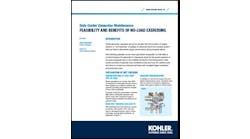DCF Show: Natron Energy's Sodium-Ion Battery Technology for Data Centers
For this episode of the Data Center Frontier Show podcast, we sit down with Brian Kennedy, Director of Business Development and Marketing at Natron Energy.
As recounted by Kennedy in the course of our talk, Colin Wessells founded Natron Energy as a Stanford PhD student in 2012. His vision in building the company, which started in a garage in Palo Alto, was to deliver ultra-safe, high-power batteries.
As stated on the company's website, "After countless hours of development with an ever expanding team of scientists and engineers, Natron now operates a state of the art pilot production line for sodium-ion batteries in Santa Clara, California."
The company notes that most industrial power utilizes decades-old, more environmentally hazardous battery technology such as lead-acid and lithium-ion.
In contract, Natron says its "revolutionary sodium-ion battery leverages Prussian Blue electrode materials to deliver a high power, high cycle life, completely fire-safe battery solution without toxic materials, rare earth elements, or conflict minerals."
In 2020, Natron became the world’s first sodium-ion battery to achieve a UL 1973 listing for its battery product, and commercial shipments to customers in the data center, forklift, and EV fast-charging markets soon began.
Natron notes that its technology leverages standard, existing li-ion manufacturing techniques, allowing the company to scale quickly. With U.S. and Western-based supply chain and factory agreements in place, Natron says it saw its manufacturing capacity increase 200x in 2022.
In the course of the podcast discussion, Natron's Kennedy provides an update on Natron's data center industry doings this year and into next year. Here's a timeline of key points discussed:
:29 - 7x24 Fall Conference Memories
:51 - Teeing Up Sodium Ion
1:18 - Talking Pros and Cons, Sustainability
2:15 - Handing It Over to Brian
2:30 - Background on Natron Energy and founder/CEO Colin Wessells
2:55 - Background on Sodium Ion Technology
3:11 - Perfecting a New Sodium Ion Chemistry and Manufacturing with 34 International Patents In Play
3:28 - The Prominent Feature of Sodium-Ion Technology Is Its Inherent Safety; Eliminates Risk of Thermal Runaway
3:51 - U.S. Government ARPA-E Advanced Technology Grants Have Been Pivotal Funding for Natron
4:13 - Sodium Ion Battery Technology Comparison and Value Proposition
5:28 - How Often Is A Data Centers Battery Punctured? Ever Seen a Forklift Driven Through One?
6:10 - On The Science of the Natron Cell's Extremely High Power Density, Fast Discharge and Recharge
6:55 - Comparing Sodium-Ion to Most of the Lithium Chemistries
7:25 - The Meaning of UL Tests
8:00 - Natron Has Published Unredacted UL Test Results
8:35 - On the Longevity of Sodium Ion Batteries
9:51 - "There's No Maintenance Involved."
10:18 - Natron Blue Rack: Applications
10:52 - How Natron Is In the Process of Launching Three Standard Battery Cabinets
11:20 - Performance Enhancements Will Take Standard Data Center Cabinets "Well North" of 250 kW
11:45 - Though Data Centers are Its Largest Market, Natron Also Serves the Oil and Gas Peak Load Shaving and Industrial Spaces
12:21 - Sustainability Advantages
12:51 - ESG Is About More Than Just Direct Emissions
13:15 - The Importance of Considering the Sourcing and Mining of Battery Elements
14:09 - "That Fact That You May Be Pushing [Certain] Atrocities Up the Supply Chain Where You Can't See Them, Doesn't Make It OK"
14:34 - Notes On Supply Chain Security with Secure, U.S.-Based Manufacturing
15:45 - Wrapping Up: Global UPS Manufacturer Selects Natron Battery Cabinet; Looking Ahead to 2024.
Podcast Quotes from Natron's Brian Kennedy:
- "Natron Energy was founded in 2012 by our founder and CEO, Colin Wessells. At the time, he was a PhD candidate at Stanford and was doing some work on some potential lithium-ion chemistries that really weren't panning out for one reason or another. He decided to turn his attention to sodium ion research. Salt-based batteries, sodium ion batteries in general, are not new - they've been around for quite a while. However, there were a number of technical challenges that just led to them not really being adopted. So what he did was to perfect a brand new chemistry that presently has 34 international patents around the the manufacturing of our cells."
- "We're going to talk about comparisons to lead acid and nickel zinc [batteries], but the predominant feature with sodium ion is its inherent safety, 100% safe, no risk of thermal runaway whatsoever. This made it a very unique chemistry out there in the world of batteries - combined with the incredibly high power density and fast discharge and fast recharge, this really is what caused the company to spool up."
- "There's absolutely zero chance of thermal runaway or our cells or our batteries catching fire under any circumstances. Whether it be over-voltage, under-voltage, high heat penetration of the cell itself, those things just can't happen. You've seen the piece that CNBC did back in May that featured us and one other company. We drilled through a cell, live on camera, with a one-inch hole saw. Not only did nothing bad happen, but the cell continued to produce voltage, even with a one-inch hole being cut through it."
- "The point that we want to make at Natron is that ESG is about more than just emissions. For example, we have no lithium, no cobalt, no copper, and no nickel in our battery chemistry. Our conductors and our separators are aluminum-based."
- "As we talk today, we've already had one global scope UPS manufacturer introduce a Natron battery cabinet into their product line. In 2024, you're going to see several more of the major UPS manufacturers who have validated, tested, integrated, and launched Natron solutions as part of their overall UPS product line and other parts of their product lines, as well as other electrical systems and devices. That's what we have on the horizon."
Here are links to some related DCF articles:
Will Battery Storage Solutions Replace Generators?
New NFPA Battery Standard Could Impact Data Center UPS Designs
Microsoft Taps UPS Batteries to Help Add Wind Power to Ireland’s Grid
Data Center of the Future: Equinix Test-Drives New Power, Cooling Solutions
Corscale Will Use Nickel-Zinc Batteries in New Data Center Campus
Did you like this episode? Be sure to subscribe to the Data Center Frontier show at Podbean to receive future episodes on your app.
Keep pace with the fast-moving world of data centers and cloud computing by connecting with Data Center Frontier on LinkedIn, following us on X/Twitter and Facebook, and signing up for our weekly newsletters using the form below.

Matt Vincent
A B2B technology journalist and editor with more than two decades of experience, Matt Vincent is Editor in Chief of Data Center Frontier.





